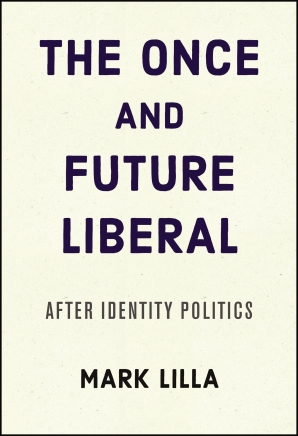
It’s hard not to focus simply on the latest tweet, appearance, or action by President Trump, especially if you are opposed to what he is doing. He is a master at grabbing attention and getting into one’s head.
At least that is true for me, a liberal, who I have to admit, is often annoyed by and occasionally disagree with some of the liberal and progressive responses to what President Trump and many Republicans are saying and doing.
So I try to stay in touch with some more conservative types, listening to what they say or write.
Occasionally on this website I post or link to something I’ve read that I think goes beyond just knee-jerk reactions or the ‘party line.’
Recently, David Remnick, editor-in-chief of The New Yorker since 1998, posted an interview he had with  Mark Lilla on the issue of identity politics. Lilla is a self-described liberal and a professor, currently in residence at Columbia University.
Mark Lilla on the issue of identity politics. Lilla is a self-described liberal and a professor, currently in residence at Columbia University.
This interview and Lilla’s views (what he believes liberals need to hear and understand) sent me to his very short book, The Once and Future Liberal.
I found the interview and the 160-page book intriguing and reflective of those with whom I talk who are not surprised by Trump’s victory nor by the loss of Democratic majorities in Congress, in state governor-ships, and in statehouses. Over and over I hear that the Democrats are too focused on identity issues, i.e., woman’s issues, minority issues, gender issues, etc. and fail to understand what has happened economically and personally to many others in this country (many who are not members of these identity groups).
While I am not entirely convinced of everything Lilla believes, some of what he says resonates with me. For example, Lilla urges that rather than call names or accuse others of being racists. etc., we need to “frame (issues) in terms of basic values and principles that we share in order to establish sympathy and empathy and identification with someone else.” And I also agree that we (Democrats) have been too focused on simply winning the White House and have given an open field to Republicans on the state level.
If you can divert for a bit from whatever the current noise is on the political scene, check out the interview: A Conversation with Mark Lilla on His Critique of Identify Politics, by David Remnick, The New Yorker, Aug. 25, 2017.
If you have a couple of hours and want to get Lilla directly, check out his book, The Once and Future Liberal.
If you read either, I would very much like to hear from you and what you think about what Lilla is saying. I urge you to consider responding in the Comment section of this post so that there can be a conversation about the issues Lilla raises.


Land Wayland said:
It is always tempting to give things “names”. These names are shorthand for the entire bundle of ideas and traits and characteristics and practices and looks and all those other things that make a “name” real. For those who understand the definition of the name, using it has many benefits but for many others, the benefits are always “ifffy”..
If there are those in your community (professional, religious, political, social) who don’t speak your language, they are simply not going to understand what the name means and you cannot communicate with them by insisting that it be used. If you want to engage these linguistically deficient neighbors, you are going to have to take the time to define the word and then be prepared to define the words you use to create this definition.
If your conversation is filled with/limited to names, it may have good meaning for you but no meaning for your listener and there soon will be no one listening.
And if it is important to you to really, truly, actually engage your listener in a conversation, and you don’t talk his/her language and keep using words he/she doesn’t understand, there is only one place to look for the silly ninnie who decided to do this. It is called a Mirror.
Apparently the Democrats think they have done a sophisticated statistical demographic analysis and they have concluded that there are enough of these special neighborhoods where identity names can be used, and they have decided that they can use modern media to quickly reach enough people who will limit their attention span to confirming that the correct name was used and will be so impressed, or thankful, or honored or hopeful that they wlll respond by voting for the Democratic candidate. Not only does analysis allow the Party to focus its time and resources but they don’t have to think about trying to make a favorable impression on anyone else. Are there really enough voters in the black/brown/LGBT/feminist/student/ecology/global-warning/asylum/recent immigrant/ neighborhoods that using those names and claiming that the Democrats identify with their “problems” will be enough, in enough Congressional Districts in enough States, to win a slim majority in one of the houses of Congress, That seems to be all they are really hoping for.
Talk about putting all of your eggs (the kind you hope to fertilize and grow into first-class replicas of Mom and Dad) into one very speculative basket. Identity politics will only work if (1) the other side does it worse than you do and (2) you have no ability to remember how or when political parties used tried and true, (and labor intensive) ways of reaching voters and persuading them to vote for your candidate.
I see very little evidence of that foresight, planning, determination, or focus among the current Democratic leadership who are still reeling from their last very bad guess. Barack and John, where is the next Knight of Bonaspe (Good Hope)?
Richard said:
Yup.
There are reasons much of the country is ‘red,’ and even though Hilliary got more popular votes than Donald, we Democrats are missing something. Whether it is this issue of identity politics (hasn’t there always been identity politics?) or something else, we need to figure it out. The fact that the Dems lost to DT is a wake up call that I don’t think has been heard.
Jay Y. said:
From https://www.theatlantic.com/magazine/archive/2017/10/the-first-white-president-ta-nehisi-coates/537909/?utm_source=feed
“Observing a Trump supporter in the act of deploying racism does not much perturb Kristof. That is because his defenses of the innate goodness of Trump voters and of the innate goodness of the white working class are in fact defenses of neither. On the contrary, the white working class functions rhetorically not as a real community of people so much as a tool to quiet the demands of those who want a more inclusive America.
Mark Lilla’s New York Times essay “The End of Identity Liberalism,” published not long after last year’s election, is perhaps the most profound example of this genre. Lilla denounces the perversion of liberalism into “a kind of moral panic about racial, gender and sexual identity,” which distorted liberalism’s message “and prevented it from becoming a unifying force capable of governing.” Liberals have turned away from their working-class base, he says, and must look to the “pre-identity liberalism” of Bill Clinton and Franklin D. Roosevelt. You would never know from this essay that Bill Clinton was one of the most skillful identity politicians of his era—flying home to Arkansas to see a black man, the lobotomized Ricky Ray Rector, executed; upstaging Jesse Jackson at his own conference; signing the Defense of Marriage Act. Nor would you know that the “pre-identity” liberal champion Roosevelt depended on the literally lethal identity politics of the white-supremacist “solid South.” The name Barack Obama does not appear in Lilla’s essay, and he never attempts to grapple, one way or another, with the fact that it was identity politics—the possibility of the first black president—that brought a record number of black voters to the polls, winning the election for the Democratic Party, and thus enabling the deliverance of the ancient liberal goal of national health care. “Identity politics … is largely expressive, not persuasive,” Lilla claims. “Which is why it never wins elections—but can lose them.” That Trump ran and won on identity politics is beyond Lilla’s powers of conception. What appeals to the white working class is ennobled. What appeals to black workers, and all others outside the tribe, is dastardly identitarianism. All politics are identity politics—except the politics of white people, the politics of the bloody heirloom.”
Richard said:
S,
Just finished the Coates article thanx to your posting of the link above. As always, he seems to be the best of today, along the lines of Richard Wright and James Baldwin. I suspect those who believe that identity politics is the Dems problem will dismiss his first white president article as over the top. But much of what he says resonates for me.
Thanx for the post/comment/quote/link.
R
Anon-2 said:
I look forward to reviewing the interview……however, if you choose to once again venture outside the liberal echo chamber, you might be once again interested in what Scott Adams has to say: https://www.pscp.tv/ScottAdamsSays/1rmGPqNdojDJN?t=0
Richard said:
Am traveling but will listen to the Adam’s link and look forward to your thoughts about this post as well as the two comments & link above.
Anon-2 said:
I finally had a chance to read…..he’s on to something. “Expressive, not persuasive” nails it. All of the “identities”, want pretty much the same thing, the “pursuit of happiness”…..but moral narcissists muddy the waters: “I want ‘X’ so that I can feel better about myself, therefore, YOU must behave a certain way…..” So for the last generation, opportunist politicians have spent time trying to divide us…….”So and so wants to do THIS to you, so you need ME to protect you….” Maybe ’twas always thus…..
Anon-2 said:
and…..I recommended the Sam Harris podcast recently….lo and behold, Lilla is his latest guest!
I haven’t listened to it yet, though…
https://www.samharris.org/podcast/item/the-fate-of-liberalism